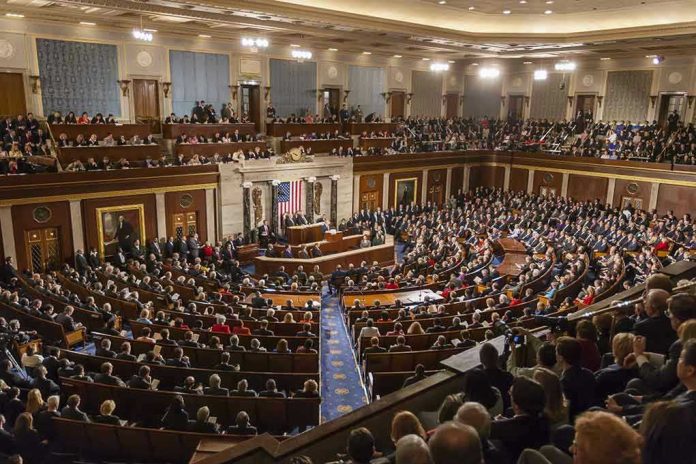
If Republicans fail to end the Senate filibuster, President Trump warns, the very survival of America is at stake—and he’s not letting anyone in his party off the hook for what he calls “weakness.”
Story Snapshot
- Trump demands Republicans “terminate” the filibuster, claiming it’s the only way to stop “deranged” Democrats
- He frames the filibuster as a mortal threat to conservative policies and the nation’s future
- Republicans face mounting pressure from Trump to abandon tradition in favor of political survival
- The debate exposes deep divisions about how far to go to win legislative battles
Trump’s Filibuster Ultimatum: No Room for Weakness
Donald Trump’s message to Republicans rings with the urgency of a fire alarm: abolish the Senate filibuster or risk losing the country to what he calls “deranged” Democrats. He’s not whispering these warnings in back rooms; he’s blasting them in public, using his signature blend of scorn and rallying cry. Trump’s logic is simple and, for his loyalists, inarguable—if Democrats are willing to play hardball, why should Republicans cling to rules that tie their own hands?
Trump’s attacks go beyond abstract procedural arguments. He personalizes the stakes, calling out Republicans as “weak” and “stupid” if they hesitate. He frames the filibuster as a relic that cost conservatives dearly during his own presidency, a tool wielded by opponents to block border security, tax reform, and judicial nominations. For Trump, eradicating the filibuster is not just a matter of political advantage; it’s a test of backbone and vision.
The Filibuster: Tradition or Trap?
The Senate filibuster, once a rarely used safeguard of minority rights, has become a daily obstacle to majority rule. Under current rules, most legislation requires 60 votes to pass, giving the minority party veto power over almost everything. Supporters say this encourages compromise and prevents wild policy swings. Critics argue it’s a recipe for gridlock and a gift to obstructionists. Trump, never one for half measures, accuses Democrats of exploiting the filibuster while plotting to kill it themselves when convenient.
Mike Johnson on Trump calling to blow up the filibuster: “What you're seeing is an expression of the president's anger at the situation…It's not my call, I don't have a say in this. It's a Senate chamber issue…The filibuster has traditionally been viewed as a very important… pic.twitter.com/6IYDosBs0R
— The Bulwark (@BulwarkOnline) October 31, 2025
For many Republican lawmakers, the filibuster represents the last line of defense against sweeping progressive reforms. They warn that without it, Democrats could pass radical legislation on voting rights, climate change, and the Supreme Court. Yet Trump’s camp counters that such restraint is a luxury conservatives can no longer afford—not when, in their view, the other side is playing by a different set of rules entirely.
Republican Crossroads: Loyalty, Legacy, and Fear of Retaliation
Within the GOP, Trump’s ultimatum has split the party. Some embrace his call to arms, convinced that holding onto the filibuster is tantamount to surrender. Others, wary of irreversible change, argue that today’s majority is tomorrow’s minority. Senate traditionalists warn that abolishing the filibuster will backfire the next time Democrats control the chamber, leaving conservatives powerless to stop their agenda.
Trump’s supporters scoff at these fears, painting them as excuses for inaction. They point to the relentless Democratic push on issues like Supreme Court nominations as proof that the opposition will abandon the filibuster the second it suits them. The message: better to strike first than be outmaneuvered again. But the threat of Trump’s wrath—always present—means few dare voice public dissent, lest they become the next target of his social media broadsides.
Filibuster Flashpoint: What Happens Next?
The battle over the filibuster is more than a procedural squabble; it’s a defining test of Republican identity and resolve. Will the party heed Trump’s call and risk a seismic shift in Senate rules, or cling to tradition and hope for compromise? The answer could determine not just the fate of countless bills, but the very nature of American governance for decades to come.
As Trump keeps hammering his message, the pressure mounts. For now, the filibuster stands—but with each public broadside, the ground beneath it grows shakier. The only certainty is that Trump won’t let the issue drop. For those in his party, the choice is stark: stand firm for Senate tradition, or yield to the relentless push to “terminate” what he calls a dangerous relic—before, he warns, it’s too late.
Sources:
Speaker Johnson doubles down on defense of filibuster



